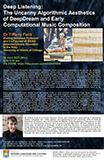Google engineer Alexander Mordvintsev’s computer vision program DeepDream is known for its uncanny, often nightmare-inducing hallucinogenic aesthetic. Once used to synthesize visual textures, the program popularized the concept of neural network training through image classification algorithms, inspiring visual art that critiqued the computational guts of machine learning and trained proprietary prediction algorithms; though DeepDream has facilitated the production of many mundane examples of surreal computer art, it has also helped to produce some conceptually rich visual investigations, including computational artist Memo Akten’s multi-channel series of films We Are All Connected, and MacArthur Fellow Trevor Paglen’s exhibition A Study of Invisible Images. While the significance of trained neural networks is presently considered valuable to computer vision experimentation, a media archeological investigation of machine learning reveals the fundamental influence early sonic experiments in computational music have in its computational and conceptual framework. Early computational music works, such as Lejaren Hiller Jr. and Leonard Isaacson’s Illiac Suite (1957), the first score composed by a computer, as well as Hiller and John Cage’s ambitious multimedia performance ambitious multimedia performance HPSCHD (1969), used stochastic models to automate game-like processes, such as Giovanni Pierluigi da Palestrina’s Renaissance-era polyphonic instruction, as well as the I Ching divination process of casting coins or yarrow stalks. Hiller’s concerns regarding the historical use of compositional/mathematical gameplay uncovers a conceptual and performative emphasis anticipating the “training” of visual models. Through the adverse reactions of audiences to Hiller’s compositions, written by what the press deemed derogatorily “An electronic brain” in 1957 parallel public reactions to the disturbing mutations of DeepDream, popular participation in the open-source project signals a growing willingness to collaborate creatively with computers to interrogate both computational and cognitive processes.
Dr Tiffany Funk is a critical theorist, artist, and researcher specializing in emerging media, computer art, video games, and performance art practices. She is Visiting Assistant Professor and Co-founder of IDEAS (Interdisciplinary Education in the Arts)—an intermedia, theory, and practice-based Bachelor of Arts degree at the University of Illinois at Chicago. Funk is also the Director of Publications at the Video Game Art Gallery (https://vgagallery.org/), and founder and Editor-in-Chief of the Video Game Art Reader, a peer-reviewed journal for video game audiences and practitioners interested in the history, theory, and criticism of video games, explored through the lens of art history and visual culture.
The talk will be conducted via Zoom: https://hku.zoom.us/j/92333450296
All are welcome. No registration is required. For enquiries, please contact Ms Lucilla Cheng via luci@hku.hk |

